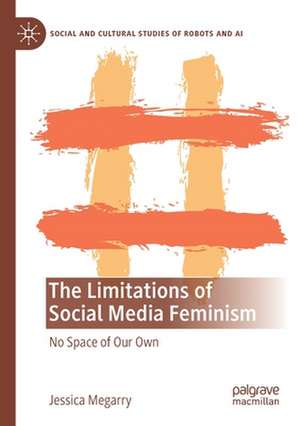The Limitations of Social Media Feminism: No Space of Our Own: Social and Cultural Studies of Robots and AI
Autor Jessica Megarryen Limba Engleză Paperback – 28 noi 2021
#MeToo. Digital networking. Facebook groups. Social media continues to be positioned by social movement scholars as an exciting new tool that has propelled feminism into a dynamic fourth wave of the movement. But how does male power play out on social media, and what is the political significance of women using male-controlled and algorithmically curated platforms for feminism?
To answer these questions, Megarry foregrounds an analysis of the practices and ethics of the historical Women’s Liberation Movement (WLM), including the revolutionary characteristics of face-to-face organising and the development of an autonomous print culture. Centering discussions of time, space and surveillance, she utilises radical and lesbian feminist theory to expose the contradictions between the political project of women’s liberation and the dominant celebratory narratives of Web 2.0. This is the first book to seriously consider how social media perpetuates the enduring logic of patriarchy and howdigital activism shapes women’s oppression in the 21st century. Drawing on interviews with intergenerational feminist activists from the UK, the USA, Australia, Canada and New Zealand, as well as archival and digital activist materials, Megarry boldly concludes that feminists should abandon social media and return to the transformative powers of older forms of women-centred political praxis. This book will be of interest to scholars and students of Women’s and Gender Studies, Lesbian and Queer Studies, Social Movement Studies, Critical Internet Studies and Political Communication, as well as anyone with an interest in feminist activism and the history of the WLM.
| Toate formatele și edițiile | Preț | Express |
|---|---|---|
| Paperback (1) | 727.69 lei 6-8 săpt. | |
| Springer International Publishing – 28 noi 2021 | 727.69 lei 6-8 săpt. | |
| Hardback (1) | 733.15 lei 6-8 săpt. | |
| Springer International Publishing – 28 noi 2020 | 733.15 lei 6-8 săpt. |
Preț: 727.69 lei
Preț vechi: 887.43 lei
-18% Nou
Puncte Express: 1092
Preț estimativ în valută:
139.25€ • 144.44$ • 116.11£
139.25€ • 144.44$ • 116.11£
Carte tipărită la comandă
Livrare economică 27 martie-10 aprilie
Preluare comenzi: 021 569.72.76
Specificații
ISBN-13: 9783030606312
ISBN-10: 3030606317
Pagini: 324
Ilustrații: XVII, 324 p.
Dimensiuni: 148 x 210 x 25 mm
Greutate: 0.45 kg
Ediția:1st ed. 2020
Editura: Springer International Publishing
Colecția Palgrave Macmillan
Seria Social and Cultural Studies of Robots and AI
Locul publicării:Cham, Switzerland
ISBN-10: 3030606317
Pagini: 324
Ilustrații: XVII, 324 p.
Dimensiuni: 148 x 210 x 25 mm
Greutate: 0.45 kg
Ediția:1st ed. 2020
Editura: Springer International Publishing
Colecția Palgrave Macmillan
Seria Social and Cultural Studies of Robots and AI
Locul publicării:Cham, Switzerland
Cuprins
1. A Fourth Wave or a Fools’ Errand?.- 2. Unravelling the Web of Equals.- 3. 'By Women, For Women, About Women': The Women’s Liberation Movement as a Free Space.- 4. 'On the Internet, there is no Women-only space': Male Power in Digital Networks.- 5. 'I don’t see any strategy really, I see more […] personal venting': Consciousness-Raising, Theory-Building and Activism in Digital Space.- 6. 'It just doesn’t feel as transparent and accountable': Social Media and Feminist Ethics.- 7. ‘Female Performers on a Male Stage’.
Notă biografică
Jessica Megarry is a lecturer in Political Science at the University of Melbourne, Australia.
Textul de pe ultima copertă
“Jessica Megarry has literally ‘hit the nail on the head’ in exposing how social media controls feminist ideas and activism thereby revealing how feminism gets watered down when it is processed by social media. ... Only when women come together to share and expose their experiences of male domination will Feminism and Women’s Liberation follow. But social media closes down that space, Megarry’s caution is right there in the title of this book, No Space of Our
Own.”
(Kathleen Barry, author of The Prostitution of Sexuality & Susan B. Anthony: A Biography)
#MeToo. Digital networking. Facebook groups. Social media continues to be positioned by social movement scholars as an exciting new tool that has propelled feminism into a dynamic fourth wave of the movement. But how does male power play out on social media, and what is the political significance of women using male-controlled and algorithmically curated platforms for feminism?
To answer these questions, Megarry foregrounds an analysis of the practices and ethics of the historical Women’s Liberation Movement (WLM), including the revolutionary characteristics of face-to-face organising and the development of an autonomous print culture. Centering discussions of time, space and surveillance, she utilises radical and lesbian feminist theory to expose the contradictions between the political project of women’s liberation and the dominant celebratory narratives of Web 2.0. This is the first book to seriously consider how social media perpetuates the enduring logic of patriarchy and howdigital activism shapes women’s oppression in the 21st century. Drawing on interviews with intergenerational feminist activists from the UK, the USA, Australia, Canada and New Zealand, as well as archival and digital activist materials, Megarry boldly concludes that feminists should abandon social media and return to the transformative powers of older forms of women-centred political praxis. This book will be of interest to scholars and students of Women’s and Gender Studies, Lesbian and Queer Studies, Social Movement Studies, Critical Internet Studies and Political Communication, as well as anyone with an interest in feminist activism and the history of the WLM.
Jessica Megarry is a lecturer in Political Science at the University of Melbourne, Australia.
Caracteristici
Challenges feminists to abandon social media as a platform for change Addresses the draw backs and dangers of social media for women Argues that social media enables men to censor and surveil feminist speech









